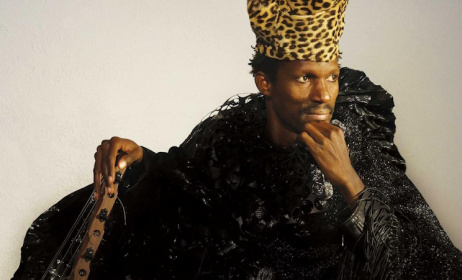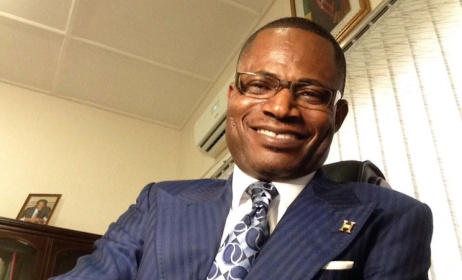ACCES 2023 interview: Victoria Nkong
All Africa Music Awards (AFRIMAs) associate producer Victoria Nkong’s contribution to the African entertainment industry spans more than two decades, with a diverse portfolio in event production, the music business and consultancy.
 Victoria Nkong.
Victoria Nkong.
Her work even extends to artist management, having worked with big names in Africa and beyond. Nkong’s dedication to helping artists turn their talents into professions has given her an unshakable reputation in the African music industry.
In November, she joins the ACCES music conference in Dar es Salaam as a speaker during a panel discussion about music entrepreneurship and artist-manager relationships, and what managers and labels need to do to nurture and support African talent. For this discussion, Nkong will be joined by other respected music professionals, including Raphael Benza (Vth Season, South Africa), Damian Soul (artist, Tanzania), Percy Yip Tong (Cyper Produktion, Mauritius) and Plot Mhako (earGROUND, Zimbabwe).
The discussion will take place at the Mlimani City Conference Centre on Saturday 11 November at 11am. Register here to attend. Africans register for free.
We spoke with Nkong about her views on the African music industry and the importance of initiatives like ACCES:
MUSIC IN AFRICA: You’ve been involved in event production for some 20 years. How has the landscape of events and music festivals in Africa evolved during this time?
VICTORIA NKONG: Event production has really evolved on the continent over the past two decades. I started out as a talent producer for the KORA Awards before becoming a line producer and eventually evolving into an executive producer, so I have passed through the different levels of production and I can identify the following major developments over the years: Previously, we had to import equipment and personnel for event production. Now, improved local resources make it cost-effective to produce high-quality events on the continent. Again, in the past, we relied on foreign artists to fill big venues at festivals but now African artists are drawing audiences both at home and abroad. They not only headline festivals but also attract international viewers, reducing the need for foreign artists and cutting logistics costs. Western brands like Live Nation are entering Africa, sponsoring events, and collaborating with African talent. This shift has led to larger event budgets. While progress is evident, challenges remain, particularly in facilitating African artists’ tours within the continent.
Can you provide insights into the challenges and opportunities you’ve encountered while consulting for talent across Africa?
There are quite a number of challenges just like with every profession, but I must confess that talent management is one of the most selfless jobs and requires a high level of discipline. Unrealistic expectations from talents can arise, especially when young artists experience sudden fame without immediate financial gains. Managing these expectations is a crucial but challenging part of a manager’s role. Additionally, funding is a significant hurdle in talent development, as it requires substantial investment with no guaranteed timeline for profitability. Maintaining discipline and professionalism in the chaotic music industry is also vital, as fame can easily affect artists’ behaviour and commitments. Drug abuse is another concern affecting artists’ mental health and productivity. Building the right team is essential, but finding individuals who understand both the artistic and business aspects can be challenging. Despite these challenges, talent management offers numerous opportunities for personal and professional growth, including cultural exposure and diverse business ventures like producing concerts and directing music videos.
How do you envision the role of capacity building in shaping Africa’s vibrant music sector, and what initiatives are you currently involved in to support this?
Capacity building in the music sector is crucial and requires more attention. This industry holds immense promise for Africa, but there’s a need for structured training for talent managers, producers, A&R, artists and everyone involved in the music ecosystem. Many rely on superficial images from media and social media, lacking exposure to the realities of the music business. The prevalence of DIY approaches often leads to rapid rises and falls in artists’ careers due to a lack of mentorship and documentation. Training should encompass financial literacy, investment, branding and business planning for artists. Managers also need education in their roles, business development, human resource management and digital portfolio management. The music industry requires trained and experienced professionals to thrive. If lawyers and doctors spend years at university to be certified members of their profession, there is no reason why anybody should enter the music industry without some form of preparation. Creativity would never be sufficient to sustain the industry, so we need people who have experience and are well-trained in the music business to pioneer and lead the business side of things. Initiatives like reality shows and digital masterclasses can play a vital role in capacity building, offering practical training to emerging talents and managers. Knowledge sharing is essential for the industry’s growth and sustainability. During the pandemic, I started my digital masterclass called Showbiz 101 where young talents are taught the foundational rules and principles needed to build a career in the music industry. I also regularly coach young talent managers and have been participating in projects like ACCES for a while now, sharing my experience and nuggets in a bid to help capacity building across the continent.
What are your thoughts on the importance of cultural exchange and collaboration among African countries within the music industry?
Apart from sports, music serves as a powerful global unifier, transcending language barriers, as people can dance to a good song regardless of its lyrics. Music events have the remarkable ability to bring people from diverse backgrounds together to celebrate their favourite artists. Music is not just a tool for cultural assimilation but also aids in language acquisition, as people often seek to understand the lyrics of songs they love. Collaboration between artists from different countries fosters cultural exchange and showcases each country’s culture and attractions. In today’s world, collaboration is recognised as a catalyst for exponential growth, expanding the reach of music across diverse fan bases. Governments and culture and tourism ministers should promote exchange programmes like ACCES, facilitating collaborations and learning opportunities for artists and creatives to enhance their industries. Initiatives like the African Bridge promote collaborations and knowledge transfer across borders, fostering long-term relationships and business opportunities. Collaborations allow artists to collectively win and showcase the diverse musical sounds of Africa to the world. Diamond Platnumz’s success after collaborating with Nigerian artists exemplifies the power of such collaborations in conquering new territories.
What are the key factors contributing to the growth of the African music industry on the global stage, and in your experience, what are the key elements that make an artist successful today?
The African music industry has undergone significant evolution and growth, marked by improved sound quality due to better production equipment and digital tools. Pioneers like Fela Kuti, Miriam Makeba and others paved the way for the current generation of African music stars who dared to perform internationally even before the age of social media and digital tools, setting the stage for the global success of artists like 2Baba, P-Square, Tiwa Savage and Diamond Platnumz. The events and festival industry also played a pivotal role, with events like the KORA Awards providing international recognition to African artists. Technology, especially the rise of social media and digital platforms, has allowed artists to reach global audiences from their home countries. The African diaspora’s growth has contributed to the export of African music, and a growing awareness of the power of African music has led to increased support from fans and media on the continent. Additionally, music is increasingly seen as a viable profession and investment, attracting more businesspeople to the industry. To build a successful career, artists must master their sound, assemble the right team – including A&R, business managers, lawyers, road managers, PR specialists, and more – create a relatable brand story and secure strong financial backing. While showbiz is about entertainment, it’s equally about business and artists need to balance both aspects to thrive in the industry.
How do you see the future of talent management and artist development in Africa, and what trends do you anticipate?
To be honest, talent management is a significant responsibility that requires a specific skill set, including business development, planning, human resources management and interpersonal skills. Proper training programmes for talent managers should be established to address the growing demand for this career. Talent management should be recognised as a legitimate and aspirational profession, similar to fields like law and medicine. Both artists and managers should treat their roles as core professions and run their businesses accordingly. Artists are businesses that require development, investment, confirmation and continual strategising. Managers should also focus on branding themselves, as a strong manager’s brand can make it easier to promote the artist. The music and talent industry has the potential to significantly contribute to Africa’s economy with the right investment and structure. It’s already making an impact by introducing African talent to the world, but there’s immense potential for further expansion.
Could you share your perspective on the importance of mentorship and mentorship programmes within the music industry?
Mentorship is a crucial element that’s currently lacking in the industry. Many in the music industry are compelled to maintain a certain image of perfection and luxury, and this facade often obscures the real challenges that young artists face on their path to stardom. This lack of guidance can lead to depression and other difficulties when the journey becomes tough. There is a pressing need for such initiatives among artists, talent managers, producers and other industry professionals. Such programmes would provide guidance and a safe space for emerging talent to seek advice and support. It’s a collective responsibility for industry veterans to actively guide newcomers, but it’s essential to choose both mentors and mentees wisely to ensure a productive and mutually beneficial relationship.
The music industry has seen significant digital transformation. How does this impact talent management and artist development?
The digital transformation of the music industry has brought numerous benefits. It has provided artists and their teams with powerful tools to measure and control the success of their work. This digital revolution has made it much easier to reach a wider audience, all from the convenience of a smartphone. Artists are no longer reliant solely on radio and TV airplay for success. Furthermore, the digital era has streamlined music production, enabling artists to create high-quality music that can compete on an international level. It has also facilitated brand building and image polishing, allowing artists to convey their stories and personas without the need for traditional media interviews. This digital shift has opened the door to DIY collaborations and even remote label discovery. However, like any technological advancement, there are drawbacks. The digital revolution has given a platform to music and content that may lack depth and quality, despite their popularity. Nonetheless, it’s a testament to the evolving landscape of the music industry.
As someone deeply involved in African music, what other significant shifts or developments have you observed in recent years that are shaping the continent’s industry?
Significant shifts have occurred in the global recognition and acceptance of African music. The Western world is increasingly celebrating African music and forging stronger affiliations with the continent. Major players in the music industry are coming to Africa in search of talent and to support the industry, driven by its potential, business opportunities and cultural richness. African artists are now dominating global charts, and making dreams come true for many. Families and businesses are also showing more interest in supporting their children in pursuing careers in music and investing in musical talent. Furthermore, media houses and clubs are playing a greater percentage of African music compared to foreign music, which was not the case in the past. This signifies a significant shift in music consumption patterns.
As an advocate for talent development, what strategies are crucial for nurturing emerging artists and helping them break into the international market?
Ensuring that artists are prepared and encouraged to create a substantial music catalogue early on to support their busy schedules. Next, providing training in live music performance and stage presence from the beginning to enhance professionalism. There’s also the need to emphasise the importance of branding and exploring artists’ creative capabilities as well as educating budding artists in financial management to prevent situations where they appear wealthy but face financial struggles later. Finally, stressing the significance of guidance for artists to build references and prioritise the mental health of these individuals, considering the challenges fame can bring.
The African music industry has seen increased recognition on the global stage. How do you believe the industry can sustain and build upon this momentum, and what role can ACCES play in this?
To sustain our progress, we must avoid complacency, consistently produce quality music and involve more institutions in the music industry. Initiatives like ACCES are crucial, as they train the next generation of African music professionals, address industry challenges and provide exposure to young artists who can benefit from labels, sponsors and collaborations. We should encourage more projects like ACCES, expanding them to different countries annually. Collaboration between African artists and labels should increase to amplify our collective voice. Establishing a robust industry structure is essential for its long-term survival.
What advice would you give to music entrepreneurs and business executives looking to expand their presence and impact within the African music ecosystem?
Aspiring artists should travel across the continent, participate in festivals, and engage in projects like ACCES and the AFRIMAs to gain experience and build a network. Remember that the music industry is also a business, so maintain a business-oriented mindset. Surround yourself with professionals and be open to collaborations. Understand that it may take time before you see returns on your investment, but with persistence the rewards can be substantial.
What message would you like to leave with the attendees and participants at ACCES 2023 regarding the future of the African music industry?
There is a big shift happening in the music industry at the moment. It is important for stakeholders to get involved in any way they can, and become a solution to a problem in the music sector, and posterity will appreciate your efforts. Remember, Africa is one. Borders were created by humans as a tool to divide us. This isn’t about Tanzania, Kenya, Congo or Nigeria – it’s about Africa, and it’s time for Africa.
Register for ACCES 2023 here.




























Commentaires
s'identifier or register to post comments